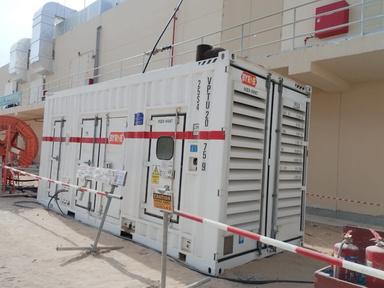BYRNE INTERVIEW KEKE SUN
Sales Executive - UAE
1. HOW HAS THE DEMAND FOR RENTAL EQUIPMENT FROM CHINESE LEASING INDUSTRY CUSTOMERS CHANGED IN THE PAST FEW YEARS? WHAT FACTORS DO YOU THINK CONTRIBUTED TO THIS CHANGE?

Over the past few years, the demand for rental equipment from Chinese leasing industry customers in the UAE market has remained active However, there have been some fluctuations due to the completion of large projects. Despite these fluctuations, there is still a promising outlook for development. Specifically, within Byrne fleet, we have noticed changes primarily occurring as projects reach their conclusion, resulting in fewer inquiries. Additionally, many projects are now predominantly in the tender stage. These factors have influenced the overall demand for rental equipment from Chinese customers

2. CAN YOU GAIN INSIGHT INTO THE SPECIFIC PREFERENCES OR TRENDS OF CHINESE CUSTOMERS FOR RENTAL EQUIPMENT? ARE THERE ANY PARTICULAR TYPES OF EQUIPMENT THAT ARE IN HIGH DEMAND?

Chinese customers, especially those associated with Byrne equipment, have a significant demand for generators, particularly those with a power capacity mid-size and below. In terms of compressors, customers usually require high-pressure units with large flows. However, it's worth noting that Chinese customers generally do not have substantial demand for Temporary Buildings. Instead, they tend to prefer purchasing or shipping them from China, only opting for rental when the hire duration is very short.





3. WHAT ARE THE MAIN CHALLENGES YOU FACE IN SERVING CHINESE CLIENTS IN THE LEASING INDUSTRY? HOW DID YOU ADDRESS THESE CHALLENGES?
One of the primary challenges we face when serving Chinese clients is the complex and timeconsuming process due to the fact that most Chinese companies belong to the Chinese government, with their head offices located in China. To overcome these challenges, we prioritize timely follow-up and effective communication to ensure that all necessary procedures are handled efficiently. This allows us to address any potential delays or obstacles promptly and maintain a smooth workflow with our Chinese clients.
4 HAVE YOU OBSERVED CULTURAL OR BUSINESS PRACTICES SPECIFIC TO CHINESE CUSTOMERS THAT HAVE INFLUENCED YOUR SALES STRATEGY OR APPROACH?
We have noticed some specific practices adopted by Chinese customers that have influenced our sales strategy. For example, some Chinese companies prefer signing a comprehensive Hire Agreement that includes all the equipment needed for a project. To accommodate this preference, we provide an overall quotation instead of requiring a separate Local Purchase Order (LPO) for each equipment item This streamlines the process and aligns with their preferred way of conducting business.


5 GIVEN POTENTIAL LANGUAGE AND CULTURAL BARRIERS, HOW DO YOU ENSURE EFFECTIVE COMMUNICATION AND STRONG RELATIONSHIPS WITH CHINESE CLIENTS? WHAT STEPS ARE YOU TAKING TO INCREASE TRUST AND UNDERSTANDING?
Effective communication and fostering strong relationships are vital when working with Chinese clients and to to handle the growing body of Chinese customers in our market a number of Chinese nationals have been employed to ensure smooth communications as we speak the native language Following on from this we then take several steps. Firstly, once an order is confirmed, we prioritize delivering the equipment on time as agreed upon with the customer If any issues arise, we provide immediate feedback and work towards resolving them promptly. Additionally, we make frequent visits to our customers to ensure their equipment is operating smoothly and address any breakdowns in a timely manner. Moreover, we are flexible in amending our invoices to match their specific requirements, which helps in building

5. 鉴于潜在的语⾔和⽂化障碍,您如何确保与中国客⼾的有效沟通和牢固的关系? 您正在采取哪些 措施来增进信任和理解? 在与中国客⼾合作时,有效的沟通和培养牢固的关系⾄关重要,为了应对我们市场上不断增⻓的中 国客⼾群体,我们雇⽤了 些中国代表来确保我们顺利沟通。在此基础上,我们将采取⼏个步骤。
⾸先,订单确认后,我们优先按照与客⼾约定的时间发出设备。如果出现任何问题,我们会⽴即提

供反馈并努⼒尽快解决。此外,我们

